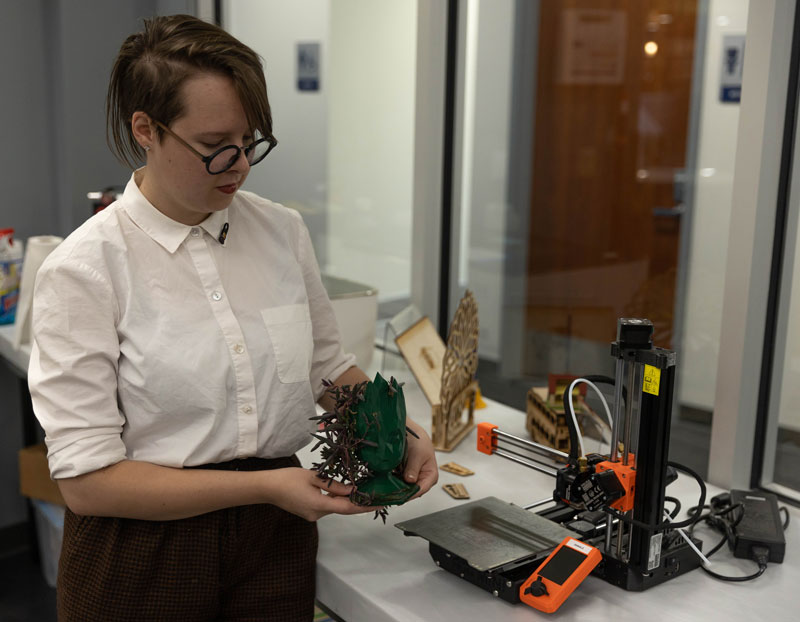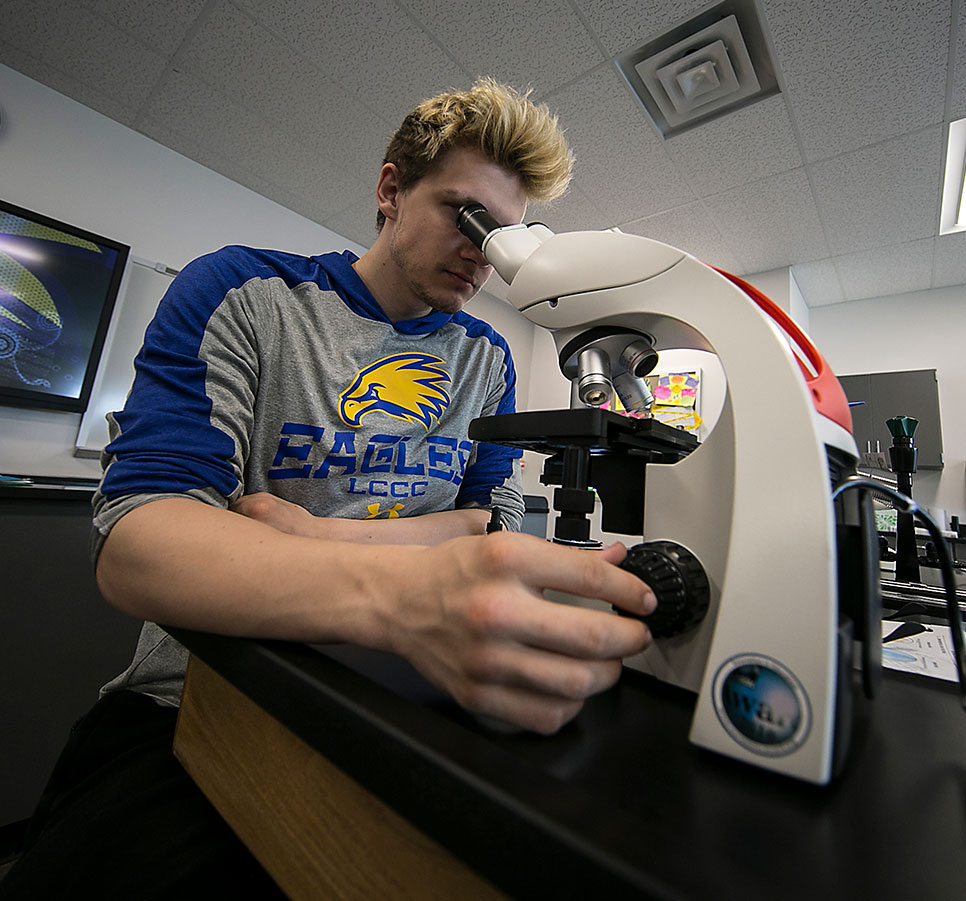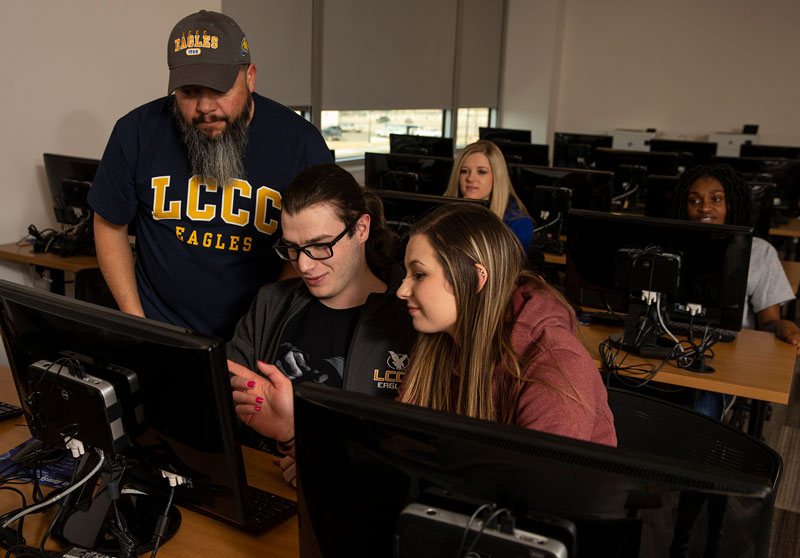September 2022
Creative ideas are born in the LCCC makerspace

Creative ideas can come to life in the Golden Eagle Wyrkshop on the Laramie County Community College Cheyenne campus.
Since opening in January, the state-of-the-art makerspace has allowed students, faculty, staff and members of the public to learn new skills with a variety of machines at no cost. Two sizes of 3D printers, a Cricut Maker, Glowforge laser cutter, sewing machines and more are available for use to create everything from puzzles to stickers to game pieces.
Visitors to the Golden Eagle Wyrkshop might not know what they want to make, but that can be part of the fun, said Linda Herget, LCCC public services specialist.
“Someone can come in and explore the space, find out what’s available and just get those creative juices flowing,” she said.
The Wyrkshop training classes are short, usually between a half hour and 90 minutes. Once people have learned how to use the equipment, they can come back on scheduled time and use it at no cost whenever it’s available.
Zoe Oman, a nursing student at LCCC who will graduate in Spring 2023, is a library assistant and Wyrkshop volunteer. Over the last year, Oman, 21, has learned to use various machines for a diverse set of tasks. She teaches classes on the Glowforge, sewing machines and Cricut machines. While she doesn’t teach the 3D printer class, Oman has used the machines to create things like puzzles for the library. Additionally, Oman said she’s made custom stickers and T-shirts.
“You can make all sorts of things,” she said. “It’s really fun.”
Oman said people shouldn’t be intimidated by the machines. The classes are free, so it’s a great opportunity to learn new skills in her spare time.
“It’s so beneficial, so I hope people will come in and enjoy it,” Oman said.
The Wyrkshop is not just for students, as members of the public are welcome to come take classes and use the machines. Whether people want to explore a hobby, create a gift or begin developing an entrepreneurial venture, the Wyrkshop can be the place to start.
“There’s that entrepreneurial side in addition to the home hobbyist kind of thing,” Herget said. “You can stay at that level or take it to this other huge level (of starting your own business venture).”
During the holiday season, staff have used the makerspace to create gifts for employees. In December 2021, Student Services staff made holiday ornaments with the Glowforge. The last cohort of dental hygiene graduates were given small teeth made in the Wyrkshop as a graduation gift.
The $35,000 makerspace at LCCC is one of six across the state, thanks to a $175,000 Wyoming Department of Workforce Services Division of Vocational Rehabilitation fund received by makerspace partners at the University of Wyoming College of Engineering and Applied Science’s Innovation Wyrkshop. The bulk of that funding provides equipment and staffing necessary for the project.
The educational value of the Wyrkshop is huge, Herget said. People who have an innovative idea can use the equipment, going through a process of trial and error until they have developed an idea.
“This is the jumping off point where you can make a lot of mistakes,” Herget said.
Some have come in to learn how to use the equipment before purchasing their own machines for personal use, Herget said.
“They can come in and learn how to use the equipment and then decide if this is really something they want to invest in for their home business,” she said.
The best way to get started, Herget said, is to visit the Golden Eagle Wyrkshop homepage. Visitors can sign up for a class and reach LCCC staff about additional information. The space can also be reserved for groups. Contact Linda Herget at lhergetFREELARAMIE or 307.778.1278 for more information.
LCCC’s biology program a head above the rest

For Laramie County Community College student Emma Oetken, fungi are incredibly interesting.
Oetken, 21, is a biology major in the STEM Pathway. Students studying the sciences at LCCC are able to dive into research, which is not always the case at community colleges. Through the Spring 2022 semester and summer, Oetken performed research on a fungus that can uptake and metabolize an element that is supposed to be toxic to it.
“It’s circumventing the toxicity and has evolved, in one way or another, to live in really high selenium areas,” Oetken said. “Now we’ve isolated it and extracted its genome and tested it in different variants of selenium and watched how it reacts to them.”
At LCCC, students interested in studying the natural world are offered more opportunities than might be expected for a school its size. Between smaller class sizes, outstanding faculty and a wealth of technology, LCCC’s science programs are exceptional in what they can offer.
LCCC’s biology program has all the benefits of small class sizes — the largest class has 24 students — with none of the detriments of being small, said Dr. Ami Wangeline, biology instructor.
“You get to know your professors, and they get to know you,” she said. “Everyone in the science department has a PhD., so we are trained scientists who have chosen to now be educators. You’re going to have top-tier faculty.”
Some smaller schools lack diversity among faculty in terms of expertise, with high numbers of adjunct faculty. But Wangeline said LCCC’s faculty have degrees in a variety of fields, representing broad expertise that can speak to students’ interests. For biology’s biggest class, General Biology, students can pick a lecture and a lab, with a different faculty member for each.
“You get to know more faculty, and then you’re more likely to have that link with your interest or make that personal connection,” Wangeline said.
Whether they’re studying animals, fungi or genetics, LCCC students can perform research and present their findings in a variety of venues, such as the University of Wyoming Research Day. Over summer 2022, two of Wangeline’s students went to Alaska to present findings at the Botanical Society of America meetings, a remarkable achievement for a school the size of LCCC.
“I thought, ‘Wow, we’re the only community college represented here,’” Wangeline said. “We have the ideal situation for research – since we have grant funding, but the goal is to involve undergraduates in the work, we are able to be very student-centered.”
The research opportunities allow LCCC students to practice science from the beginning of their college journey, Wangeline said. Whether it’s based on classroom experiences or more individualized research experiences, the LCCC approach engages students in a unique way.
“It keeps you engaged and gives you a chance to do something novel right at the beginning,” Wangeline said. “A lot of times that excitement translates into confidence, which then translates to success.”
Some students, Wangeline said, might be concerned that they won’t have the opportunity to work with cutting edge instrumentation at a smaller school like LCCC that they might have at a large university. This could leave students feeling like they’d be behind their peers that went to larger institutions. But at LCCC, Wangeline said the opposite is true.
Grant funding since 2008 has allowed LCCC to accumulate a high level of equipment for use in the study of science. That includes things like the gas chromatography–mass spectrometry, or GC mass spec, and a scanning electron microscope, or SEM.
“We have a variety of high-tech equipment,” Wangeline said. “Wherever you’re at, the faculty are going to meet you there and then we’re going to train you on the things you need to know, based on your interests and what your ultimate career goals are.”
LCCC science programs, including biology, provide a foundation for students to complete their bachelor's degree and beyond. Students who start at LCCC and complete a four-year degree or higher can land jobs in the medical field, veterinary science, pharmacy and as professional scientists. Those graduating with a four-year degree or higher in biology can earn a regional average rate of $36 per hour in their career.
Those interested in LCCC’s biology program can visit LCCC’s Science, Technology, Engineering and Math webpage.
Why choose a 2-year college over a 4-year college?

When contemplating going to college, some prospective students are inclined to think they need to go to a four-year college right from the get-go. But for many looking to start their higher education journey, the opportunities offered by two-year institutions can be better fit.
For starters, it can be easier to apply to a two-year institution than a four-year school. Some four-year institutions require essays and letters of recommendation as part of the application process. Many community colleges, on the other hand, do not. And at Laramie County Community College, for example, there is no application fee. Completing an application for LCCC only takes about 5-10 minutes, said Sarah Hannes, Enrollment Services director.
“Not all questions are required, but we highly suggest you complete and answer all of the questions to make the enrollment process quicker,” she said.
Cost is a serious matter of concern for most considering college. The cost of attendance at institutions of all sizes has risen in the last several decades, and the White House estimates the cost for four-year private and public colleges has tripled. All the while federal support has not kept pace with the rising cost, resulting in more borrowing. The skyrocketing cumulative federal student loan debt — $1.6 trillion and rising for more than 45 million borrowers — is a significant burden for many Americans.
Going to a two-year institution can save students money as they’re beginning college careers. Average annual tuition and fees for public, in-district community colleges in 2021-2022 came to $3,800 compared to $10,740 at public, in-state four-year schools, according to the American Association of Community Colleges. A college like LCCC is more affordable than many four-year institutions, Hannes said, with out-of-state students often coming to LCCC for less than it would be to stay in-state. Especially for those planning to live on campus, students stand to save more by attending LCCC than they would at a four-year college.
Additionally, LCCC offers scholarships and financial aid opportunities in the same way four-year institutions do, giving students the chance to chip away at the cost. With private donor scholarships, institutional scholarships and the ability to qualify for federal aid, students exploring a two-year school like LCCC may find the cost-savings significant.
At LCCC, students take part in the pathways approach to their higher education, designed to help students match their interests to their end goals of prosperous, fulfilling careers. With a pathway, students can explore different programs with low risk of wasting credits or semesters. The approach allows students to explore a variety of options before deciding what exactly they hope to accomplish in college.
“Being able to start college in a pathway based on your interests and goals your first semester gives students the opportunity to continue exploring career and transfer options,” Hannes said.
There is a correlation between student success and smaller class sizes, according to 2020 research published in Educational Researcher, a peer-reviewed academic journal. While many universities have classes with hundreds of students, community colleges offer classes with a much smaller student-instructor ratio. At LCCC, the student-to-teacher ratio is 15:1.
“This means stronger relationships are made and students don’t get lost in a large classroom environment,” Hannes said.
Many community college students will need to move on to a four-year institution to complete their degrees and find the careers they want. Hannes said LCCC is set up so that students can transfer with relative ease when they complete the community college part of their journey. Staff at LCCC are ready and willing to work with students to make sure they are successful in this regard.
“Having communication with your student success coach and pathway coordinator will be important for this to be successful,” Hannes said.
For those looking to complete a program and enter the workforce in two years or less, LCCC has a wealth of options available that can get you in the workforce in less time than you would going to a four-year college. Some certificate diplomas can be earned in just a semester.
Some students, often nontraditional students, need to strike a delicate balance between work, family and their education. LCCC offers many courses with flexible options, whether that’s on-campus, online or hybrid, as well as holding classes at different times of the day to accommodate life and schedules.
Finally, some who might otherwise be interested in a community college over a four-year school worry they won’t have the full college experience and quality of life on campus. But Hannes said LCCC has an amazing college feel to it.
“LCCC has residence halls that house more than 600 students on campus, something that not all community colleges offer,” Hannes said. “LCCC also has athletics, intramural sports, clubs and organizations, and a Student Life Office that is always hosting events and activities for students, as well as their families.”
Those interested in learning more about the advantages of a two-year institution like LCCC over a four-year college can contact LCCC Admissions at 307.778.1212. Virtual information sessions are available.

